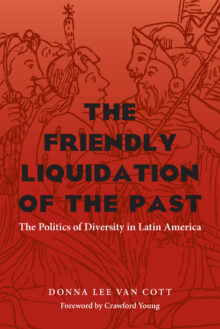
Donna Lee Van Cott
Donna Lee Van Cott is assistant professor of political science at the University of Tennessee, Knoxville. She was previously director of the Project on Indigenous Peoples at the Inter-American Dialogue, where she edited a volume of essays, Indigenous Peoples and Democracy in Latin America. The dissertation upon which this book is based won Georgetown University’s Harold N. Glassman award for the best dissertation in the social sciences.
The Friendly Liquidation of the Past
The Politics of Diversity in Latin America
Constitutional reform has been one of the most significant aspects of democratization in late twentieth century Latin America. In The Friendly Liquidation of the Past—one of the first texts to examine this issue comprehensively —Van Cott focuses on the efforts of Bolivia and Colombia to incorporate ethnic rights into their fragile democracies. In the1990s, political leaders and social movements in Bolivia and Colombia expressed dissatisfaction with the quality of democracy–its exclusionary nature, the distance and illegitimacy of the state, and the empty promise of citizenship. The highly symbolic act of constitution making elevated a public struggle for rights to the level of a discussion on the meaning of democracy and the nature of the state. Based on interviews with more than 100 participants in the reforms, Van Cott demonstrates how issues promoted by social movements—recognizing ethnic diversity, expanding political participation and improving representation, and creating spheres of cultural and territorial autonomy—were placed on the constitutional reform agenda and transformed through strategic interaction with political power-brokers into the nation’s highest law. The analysis follows each reform through five years of implementation to assess the early results of what Van Cott suggests is an emerging regional model of multicultural constitutionalism. The Friendly Liquidation of the Past fills an important gap in the study of ethnic politics and constitutional reform in the Andes, linking the literature on institutions and political reform to work in political theory on participatory democracy and multiculturalism.

